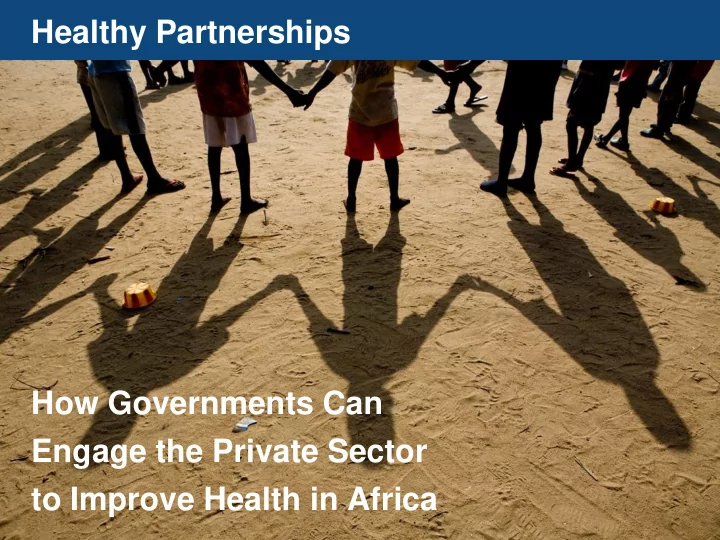

Healthy Partnerships How Governments Can Engage the Private Sector to Improve Health in Africa 1 1 THE WORLD BANK
Context of Health in Africa initiative Policy, Analysis, Investment 2007 Report Addressing private sector constraints Operating environment Access to finance Risk pooling or insurance Human resources 2 THE WORLD BANK
The Power of Two Seeing with two eyes Seeing the full health sector, with its public and private components Working with two hands Both partners in the health sector, public and private, need to work together 3 3 THE WORLD BANK
Starting point: 3 observations 1. Health systems improvements are urgent 2. Private sector: half of all services 3. Operating environment: constraint to improved contributions by private sector 4 THE WORLD BANK
What’s an operating environment? Private Private health Health sector sector sector • health • regulatory • engagement expenditure and business • access and environment quality • supporting no data; • health status services difficult to measure 5 THE WORLD BANK
Systematic assessment of engagement In-depth interviews in 45 countries Good examples of what works well Informing and motivating reform 6
Waiting for utopia vs. practical change now? 7 THE WORLD BANK
What constitutes engagement? 5 elements. 1. Policy & dialogue 2. Information exchange 3. Regulation 4. Financing 5. Public provision of services 8 THE WORLD BANK
1. Policy and dialogue: low implementation Out of 45 countries … 39 countries have 12 countries a policy toward the implement policy private health sector 27 countries do NOT implement 30 countries have weak dialogue or none at all 9 THE WORLD BANK
2. Information exchange: too low 33 countries require Information reaches the ministry private facilities to provide information 3 Yes No 30 10 THE WORLD BANK
3. Regulation: lack of prioritization Quality inspections 45 Comprehensive 40 registry of 35 private facilities 30 in only 6 25 20 countries 15 10 5 0 On paper In practice 11 THE WORLD BANK
4. Financing: a key instrument In 18 countries, contracts with private providers In 16 countries, financial incentives Technically, politically difficult Expansion of insurance – a “game changer” 12 THE WORLD BANK
5. Public provision of services: frequent Inclusion in public health programs (e.g. ARVs, immunization) Inclusion at times conditional on compliance 13 THE WORLD BANK
Engagement scores across the region Country P&D (10) Inf. Ex. (8) Reg. (13) Fin. (6) PPS (2) Burundi 3 2 5 4 1 Kenya 9 5 7 2 2 Rwanda 8 6 7 6 2 Tanzania 8 5 7 2 2 Burkina Faso 8 6 8 2 1 Nigeria 8 5 8 2 2 Chad 3 2 4 0 1 DRC 2 2 5 1 1 Mauritius 8 8 11 4 1 South Africa 9 5 13 3 2 14 THE WORLD BANK
Private health sector has to step up Private health sector organization Government needs a Organized Not organized counterpart to engage with Credible 26 Capable 19 Representative 15 THE WORLD BANK
Key findings of the Report Concrete steps are not being taken In effect, half of the population is abandoned On paper, things are good. In practice, they are not Regulations are inconsistent with current practices and the capacity to enforce Good instances of engagement in interventions and disease programs are not enough Engagement must be systematic and deliberate The organization of the private sector matters 16 THE WORLD BANK
What is next? 17 THE WORLD BANK
Recommendations: governments Government must lead Quick wins Establish effective dialogue Know who is doing what Start now Review policies and practices Focus on implementation Expand insurance Support quality enhancements 18 THE WORLD BANK
Recommendations: Private Health Sector Organize; then, seek dialogue Encourage members to Formalize Join provider networks Build capacity in clinical practice and in business management 19 THE WORLD BANK
Recommendations: Donors, third-parties Support engagement and take active role, if requested Include private sector in country support programs Align programs with priorities coming out of dialogue 20 THE WORLD BANK
Resources ready to use right now In addition to ongoing work, toolkit is ready for use Concrete guidance on engagement, private sector assessment, and capacity building All publications are online for your use and distribution Also in-depth country studies and further analytical work www.wbginvestmentclimate.org/health 21 THE WORLD BANK
The Power of Two Reduces waste Saves lives 22
Recommend
More recommend